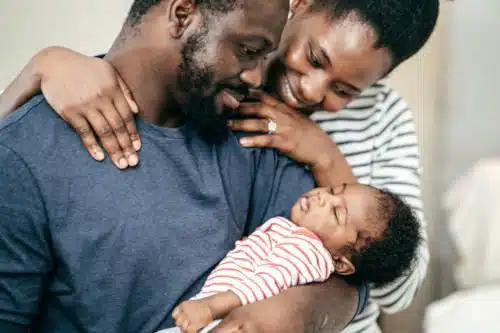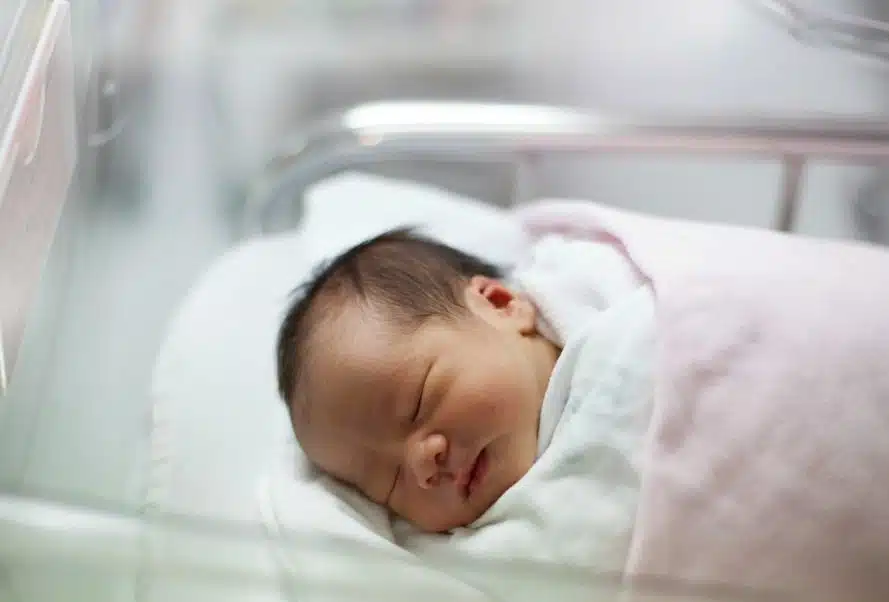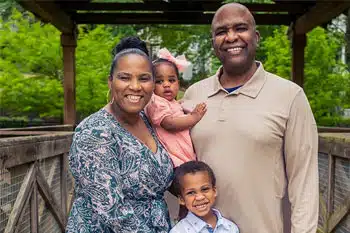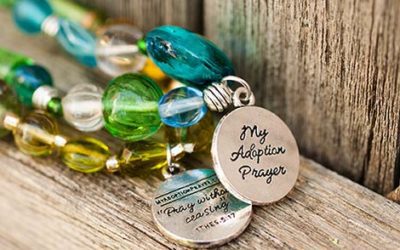
In today’s modern, open adoptions, most adoptive couples decide upon the baby’s name with his or her birth mother. Naming the baby together is really the best option for bringing the baby’s past together with its future.
To avoid confusion or hurt feelings, it’s best to discuss the name with the birth parents and your adoption professional. You’ll want to have this discussion as soon as possible, preferably early in on your adoption match.
Choosing a New Name for Your Adopted Baby
If you’re like most hopeful adoptive parents, you’ve imagined yourselves choosing names. Or you might have begun the adoption process with boy and girl names already in mind. But a name is an essential part of a person’s identity. It’s critical to have respect if you’re choosing a new name for your adopted baby or child.
Many adoptive families struggle with what to name their adopted baby or child. How do you give your child a name that relates to their heritage and is a part of your family? After all, a name is more than just something a person is called. It becomes part of their identity. Choosing wisely and keeping the child’s best interest in mind is important.
Many adoptive couples come to Lifetime after years of infertility. When many aspects of parenthood are unavailable to them, naming their child feels like one thing that they can control. Others have a family responsibility to pass down the name of a loved one. Some feel that giving their adopted child a family name is important in identifying this child as theirs.
Imagine telling your child at 12 how you decided upon a name and scrapped the name given to them at birth. It’s about the child and his or her experience about being named. Really think about what story you would like to be able to tell them. Also, what would you like your child’s birth parents to be able to tell?
As you establish a relationship with the birth mother during the match process, we recommend working out the baby’s name together. For example, your Adoption Coordinator could arrange a meeting where you and the birth parents come together, each with a list of your favorite names. Such discussions often end in the parents landing on a name that everyone likes. Plus, you’ll have a lovely, cooperative story to tell your child as he grows up!
Keeping Your Adopted Baby’s Name
Your baby’s birth mother may have a name in mind or want the opportunity to leave a little bit of her own imprint on her baby’s life before they are placed with you. Some adoptive parents choose to keep their baby’s original name given to them by their birth family, out of respect.
Birth mothers understand that they are relinquishing parental rights, but not their status as the first mother. She is taking an enormous leap of faith by placing her precious newborn into the arms of a couple she has had so little time to get to know. As a result, she may feel she needs to leave a mark of her love on her child with a name.
The birth mother may have been calling her baby by a cherished name during her pregnancy. Or, she may have already decided this would be her only child and her only chance to name a baby. Like the adoptive family, she may have a similar pressure to pass a family name down, especially because another family will raise this child.
Another option adoptive couples have chosen is to use their child’s original name as their middle name. This way, the child will always have the name given to them by their birth mother, but they can also have a name given to them by their adoptive family. This type of name selection works well for domestic infant adoptions.
Adopted Birth Certificate – What Name Will it Show?
In adoption, there are two birth certificates for the child: the original, issued at birth, and the certificate issued when the adoption is finalized.
Both certificates will have the most important details: date and time of birth, location of birth, etc. The original birth certificate lists the birth mother’s name and the name she gives her baby. After she gives birth, hospital personnel will bring a birth certificate to the birth mother to fill out. She is able to put the name she chose for her baby on this birth certificate.

This new birth certificate will list you as the parents. So if you decide to change the child’s name, you will do so on the new amended birth certificate, which will also list your names. In this way, both families have had the opportunity to name the child “officially” on paperwork from the state.
What if We’re Adopting a Child?
Couples adopting a toddler or older child often find the decision of a name more difficult. Some will choose to change the child’s name because their original name is difficult to pronounce. Other times, the adoptive family would like to choose a name that will assimilate better with the culture in which they plan to raise their child. Because of this, and research showing that name discrimination is real, adoptive parents might decide to give their child a more typical American name.
Deciding to change a child’s name may seem like a small decision, but it can have a significant impact on their lifetime. A person’s name is a fundamental aspect of their identity formation and can be an important link to their cultural, racial, or ethnic background. Knowing and understanding one’s roots is essential for developing a strong, positive self-identity.
For children adopted at an older age, their birth name can hold significant importance as they have been identified by that name for a considerable amount of time. “When kids come in to the family past infancy, they don’t like to have their names changed,” says Deborah Gray, a social worker and author of Attaching in Adoption: Practical Tools for Today’s Parents. “It is disconcerting to have so many identity factors change, and also to have their names changed.”
Choosing to alter the name of a child may appear insignificant at first glance, but in reality, it has the potential to affect their entire life. Parents who decide to give their adopted child a new name must know that it may be hard for their child to adjust. The child might also think their given name was bad or their culture was bad.
Naming in Adoption
Naming your child is an important part of making them a member of your family. It is a personal decision that will take time and consideration to determine what is the right choice for your family (and more importantly, your adopted child!)
What’s most important is considering the best interests of the child and how they feel about their name. Considering the child’s feelings, how a name change will affect them, and their feelings about it should be the most crucial deciding factor. Take the necessary time to consider what your child may think about the decision when they get older.
Editor’s Note: This article was originally published on January 26, 2016, and has since been updated.
Founder of Lifetime Adoption, adoptive mom, adoption expert, and Certified Open Adoption Practitioner (C.O.A.P).
Since 1986, adoption expert Mardie Caldwell has been dedicated to bringing couples and birth parents together in order to fulfill their dreams.
“Many years ago, I was also searching for a child to adopt. We didn’t know where or how to get started. Through research, determination, and a prayer, our dream of a family became reality. I started with a plan, a notebook, assistance from a caring adoption consultant and a lot of hard work; this was my family I was building. We had a few heartaches along the way, but the pain of not having children was worse!
Within weeks we had three different birth mothers choose us. We were overwhelmed and delighted. Many unsettling events would take place before our adoption would be finalized, many months later. Little did I know that God was training and aligning me for the adoption work I now do today. It is my goal to share with our families the methods and plans which succeed and do not succeed. I believe adoption should be affordable and can be a wonderful “pregnancy” for the adoptive couple.
I have also been on both sides of infertility with the loss of seven pregnancies and then conceiving by new technology, giving birth to a healthy daughter. I have experienced first-hand the emotional pain of infertility and believe my experience allows me to serve your needs better.
It is my hope that for you, the prospective parents, your desire for a child will be fulfilled soon.”





0 Comments